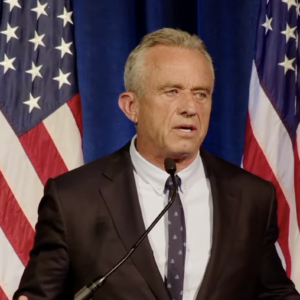A new poll obtained by InsideSources shows Americans disapprove of the job Health and Human Services Secretary Robert F. Kennedy Jr. is doing overseeing the nation’s health care — and they have serious concerns about his links to lawsuits targeting the drug companies he regulates.
The YouGov/Taxpayers Protection Alliance (TPA) poll found just 37 percent of Americans have a favorable view of Kennedy, lower than the 43 percent who give his boss, President Donald Trump, a positive rating.
Support for Kennedy is sharply divided along party lines, with 66 percent of Republicans viewing him favorably, compared to just 31 percent of independents and 12 percent of Democrats.
Only 29 percent of respondents said Kennedy is the right person to guide U.S. public health decisions. Among GOP voters, 54 percent expressed confidence in him, compared to 21 percent of independents and just 8 percent of Democrats.
“The problem is obvious,” said TPA Senior Fellow Ross Marchand. “People don’t trust him.”
Marchand tied the lack of trust to Kennedy’s failure to live up to his pledge of “radical transparency” in public health.
Although Kennedy is known for his vaccine skepticism, 78 percent of respondents said they did not know he could profit from a lawsuit over the vaccine for HPV. In response, 59 percent said it was unethical for Kennedy to oversee public health.
When Kennedy was being considered for the job, The Wall Street Journal noted that his government ethics filing acknowledged his ongoing legal work or positions with trial firms, including Morgan & Morgan and Wisner Baum. The latter is suing drugmakers over the HPV vaccine and has paid him about $2.5 million. Kennedy’s son, Conor, is an attorney at the firm.
“He’s a trial lawyer, a specialist in extortion by litigation — a practice he acknowledges he wants to encourage via public office,” Journal columnist Kim Strassel wrote at the time.
Earlier this year, Kennedy promised to divest himself from referral fees he could earn from litigation involving an HPV vaccine. Instead, the money would go to one of his sons — a move Marchand called a financial conflict of interest.
“That’s deeply concerning,” Marchand said, “because in his tenure as HHS secretary, Kennedy has worked to undermine medical innovation in a way that his family members could personally benefit.”
In June, Kennedy fired all 17 members of the Advisory Commission on Immunization Practices, an independent committee that makes vaccine recommendations. That, despite a promise months earlier to retain them. Weeks later, he called off a meeting of the federal task force responsible for determining which preventive health measures are fully covered by insurance companies.
These moves have led many Americans to say that more public health officials should have a medical background. The YouGov/TPA survey found 53 percent want federal guidance and safety standards set by officials with medical training and credentials. Only 11 percent want those standards written by political appointees.
Even more striking, 74 percent of Americans said they would not trust a political appointee with no medical background — including 86 percent of Democrats, 72 percent of independents, and 61 percent of Republicans.
While Americans may distrust political appointees, they remain confident in their personal physicians. The poll found 62 percent trust doctors to provide accurate information about vaccine safety. That included 76 percent of Democrats, 51 percent of Republicans, and 47 percent of independents.
Marchand said that doesn’t mean public officials and doctors are always right or that their advice should go unquestioned.
“Americans value transparent scientific research that is published, for example, on federal websites and databases,” he said. “They prefer that to arbitrary decision-making and on-the-fly scientific guidance.”


